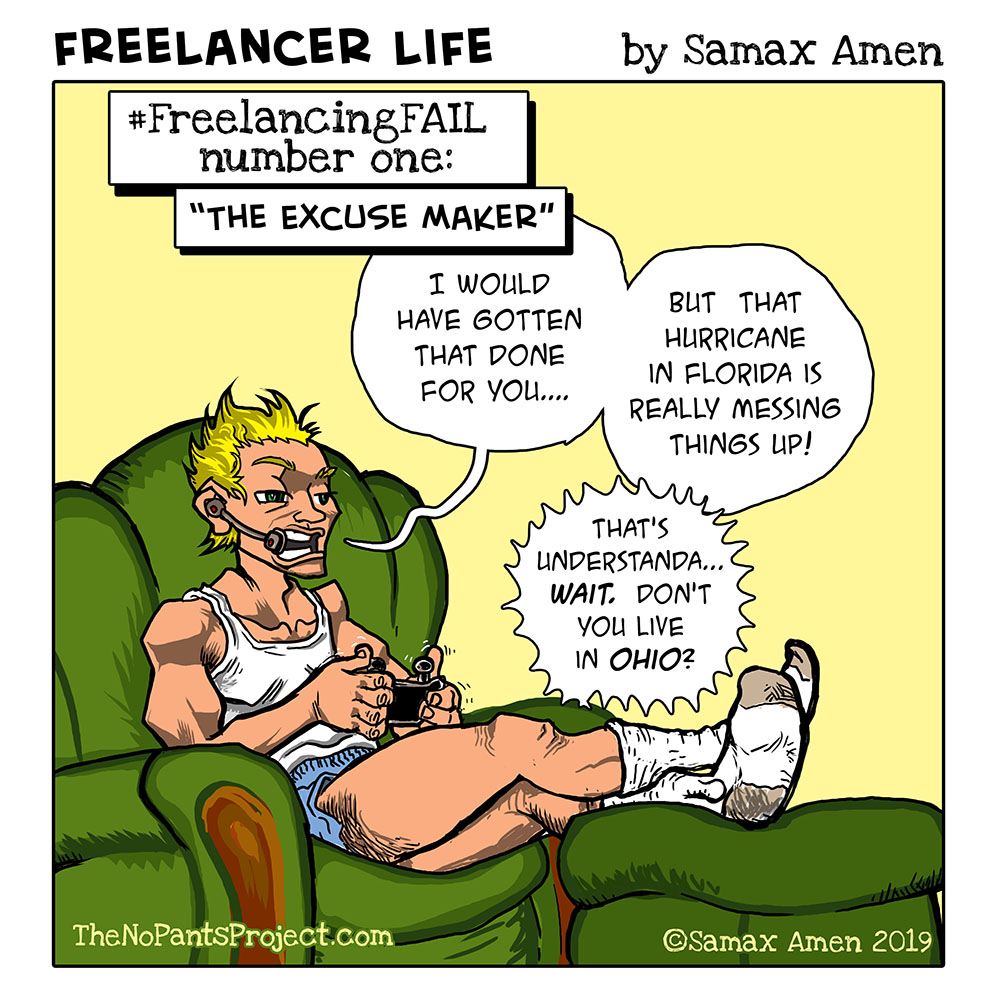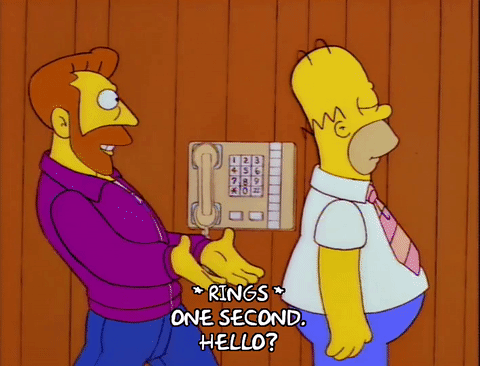You’re good at what you do.
Your skills are in demand.
You know who your ideal clients are and where to find them.
You’ve worked with some clients, and delivered some wins.
You have the pieces to the puzzle, but you’re still not making ends meet.
When you find a client you like, you struggle to get them to give you referrals and repeat business.
Repeat business and referrals from the right client can bring stability and sanity to the otherwise insane world of freelancing.
“More clients is not the answer. Instead, fewer clients that pay you more each month, every month is the way to build a truly profitable freelancing business,” said Michael Shreeve, founder and head trouble maker of The No Pants Project.
It’s harder to acquire a new client than to generate repeat business and referrals from an existing one.
In fact, Invesp CEO Khalid Saleh points out that it costs five times as much to attract a new customer than to keep an existing one in this analysis of customer acquisition vs customer retention costs.
You don’t have to spend as much time and brainpower convincing an existing client that you can do the job, learning the ins and outs of their business, adjusting to a new communication style, and studying their competitors.
Much of that work only needs to be done once.
You actually get more efficient at serving them over time.
That time saved means money in your pocket.
Then there’s referrals: asking your clients to refer their peers to you.
“Referrals are your best sales opportunities… This process leads to exponential growth, where one client can lead to two, two to four, four to eight, and so on,” said Bill Cates, an internationally recognized expert and keynote speaker on attracting more high-level clients and founder of Referral Coach.
This is great because it cuts out a lot of the sales process.
If you do a good job, your client will happily act as your agent, sending you a stream of pre-qualified prospects.
Cool, right? But it’s not just good for you.
Good clients WANT to give you repeat business and referrals.
When you do your job right, your clients would prefer to give repeat business to you, rather than find a new freelancer every time they need what you do.
“Finding a vendor, employee or partner who will consistently play their part is one of the great challenges in business,” said Shane Perlman, CEO of Modern Tribe.
“I was always looking to build a team to help me bring about my vision,” says Tyrone Moore of Ra Seth Enterprise LLC, who I recently entered into a retainer agreement with after several small, successful projects. “I wanted to find people I can depend on and who understand and believe in what I’m trying to do.”
Why would business owners like Shane and Tyrone want to waste their precious time and money finding and breaking in new talent if they don’t have to?
The easy answer is they don’t, so they will give you repeat business if you let them.
And during spells where they don’t need you, they are happy to refer you to someone else.
They like to put other people’s money in your pockets because if they help you out, you are likely to return the favor in the future.
And if you do a good job for their peer, it reflects well on them.
So if it’s so beneficial for them, why aren’t your clients giving you repeat business and referrals?
When you find clients who are willing and able to pay you what you’re worth, but you still have trouble getting repeat business and referrals from them, the issue may be trust.
Showing the client that you can be trusted to take responsibility for things that need doing in their business will make it easy for them to give you more work and referrals.
There is ONE HABIT you MUST break to move to the next level:

Making Excuses is absolutely toxic to your ability to get and retain good clients.
“After years of working with freelancers, I’ve concluded that dependability often trumps talent,” says Shane Perlman. “I would rather have a solid coder who consistently delivers than a temperamental genius.”
Making excuses damages one of the most import aspects of your business.
Trust.

As Arthur Gensler writes on Fortune: “Trust is the most powerful currency in business.”
Imagine that you’re a chicken farmer and you have werewolves running off into the night with your chickens. You try to fight the werewolves, but you are barely getting out alive every night, and you’re losing chickens by the dozens.
Then a freelance werewolf wrangler rides into town on the back of a unicorn swinging a silver-bladed samurai sword, insisting that he will be happy to save your chickens and rid you of this wolfen scourge. Of course, you are a smart chicken rancher, so you toss him a bag full of gold coins to handle your pesky werewolf infestation, freeing you to do what you do best.
There’s just one problem:
This guy turns yellow and faints the first time he sees a werewolf.

When asked, he assures you that he has killed werewolves in the past, but that your werewolves are much bigger and more powerful than any he has heard of or seen before. If you had told him how mighty your werewolves were, he would have brought more firepower.
Now he’s insisting that you pony up more money so he can invest in an assault rifle and some hollow-pointed silver bullets. And he’s probably gonna need some back up. But he has a friend who can help!
At your expense, of course.
Maybe you pay for the upgrade. Maybe you fire the guy.
Either way, you are worse off than you started, with no guarantee that you’ll be werewolf-free anytime soon.
This is the situation you put your clients in when you over-promise and under-deliver.
When you make excuses.
When you blame God, the government, and the client for your inability to do what you said you would do.
Making an excuse may seem like the perfect solution to you, but for your client, it’s the beginning of a whole new set of problems.
Things that happen when trust is weak or damaged:
- Micromanaging: One of the worst consequences of a lack of trust is micromanagement. Tracking time. Frequent calls or texts. Second guessing your work. Yuck.
- Duplication of Work: Here comes the competition. Once your client decides they can’t trust you, they return to looking for someone else. They frame it as anything but competition, but you should know better.
- Reduction of work – and worse – pay: Now that they have that other guy, you can expect even less work coming your way. Until…
- Ghosting: Clients don’t always bother to take the time to fire you. Often they just stop answering your messages.

These outcomes are inevitable when you have the habit of making excuses.
It’s a bad habit that works when you are an employee, a low man or woman on the totem pole.
When you fail as an employee, finding an excuse sufficient to convince your superiors not to punish you is the solution to your failure.
“Sorry I’m late. Traffic was terrible.”
“My computer is down. I’m waiting on IT.”
“The data you gave me was incomplete.”
Finding someone to blame for your failure is a solution for an employee because outcomes are your superiors’ responsibility.
If your superior believes someone else is responsible, they will move on.
You get to keep your job and your sweet, sweet paycheck.
The Employee Crisis may be averted, but the real problem created by your failure remains unsolved.

Being a successful freelancer is different.
Successful Freelancing requires you to stop thinking like an employee.
You’re not a victim anymore, so abandon the powerlessness of the employee mentality.
The Employee mentality is BAD for your business.
Mike Shreeve often admonishes us here at The No Pants Project, saying, “the sooner you can get out of the Employee Mindset the sooner you’ll start succeeding as a freelancer.”
Clients Don’t Buy Problems, They Buy Solutions
Your client didn’t want a new employee to manage.
Someone who blames others when problems arise.
Your client is looking for someone who they can Trust to take things off their plate.
They want to stop worrying about the Werewolves.
Make Building Trust Your ONE THING

Gary Keller and Jay Papsan’s New York Times Bestselling book The ONE Thing challenges you to ask the question:
“What is the ONE Thing I could do in this area so that by doing it, I would render everything else easier or unnecessary?”
If you want clients to give you a steady flow of repeat business and referrals, your ONE Thing is Building Trust with them.
Everything that you’re doing with this client that doesn’t Build Trust must be eliminated or tweaked so that it builds trust.
Building Trust Checklist
-
- Be a Solution, not a Problem: When something goes wrong, figure out how to solve the problem, then go to the client and explain what happened. Diagnose causes that lead to the problem without blaming. Take ownership of the solution, so the Client doesn’t have to.
-
- Be Easy: It’s a good idea to make working with you easy for the Client. If they hate paperwork, call them on the phone and fill out forms for them. Automate processes that repeat. Remind them that working with you is easier and more convenient than working with someone else.
-
- Take Responsibility: My mom always said to me growing up, “It doesn’t matter whose fault it is. It matters whose problem it is.” When you take responsibility, you reduce the burden on your client.
-
- Keep it to yourself: “Don’t worry about it anymore. I got this.” These are magic words to a Client. Don’t bother the Client about details unless totally necessary. A Client who has nothing to worry about is a happy Client. A happy Client pays well and often.
- Keep it to yourself: “Don’t worry about it anymore. I got this.” These are magic words to a Client. Don’t bother the Client about details unless totally necessary. A Client who has nothing to worry about is a happy Client. A happy Client pays well and often.
-
- Play Favorites: Ideally, you will make Building Trust with clients second nature. But you also need to know where your bread is buttered. Clients that supply the most rewarding work (whatever that means to you) should be prioritized. A client who pays generously and is well-connected in your chosen industry or niche can make a huge difference in your business, so make a huge difference in theirs!
- Play Favorites: Ideally, you will make Building Trust with clients second nature. But you also need to know where your bread is buttered. Clients that supply the most rewarding work (whatever that means to you) should be prioritized. A client who pays generously and is well-connected in your chosen industry or niche can make a huge difference in your business, so make a huge difference in theirs!
-
- Look for Opportunities to be Trusted: In conversations with your Client, listen for problems, discomfort, and pain that your Client is experiencing. These are opportunities to be Trusted. Design and propose solutions. Phrases like, “Why don’t you let me worry about that?”, “I can take that off your plate”, and “You focus on ____, while I handle this,” can lead a customer into a conversation where you can sell them additional services.
-
- Under-Promise and Over-deliver: Start small at first. Make the biggest promise that you’re 100% sure you can do, and then hit a home run!
-
- Express Gratitude: Practice this phrase: “Thank you for Trusting me with this.” Business owners enjoy unsolicited gratitude more than most people. Gratitude shows the Client that you recognize and appreciate what they bring to your business.
-
- Don’t Ask to be Trusted: When someone says “Trust me…” we naturally assume that whatever comes next is at least partially untrue. You don’t get Trust by asking for it. Set your intention to be trustworthy by following these tips, and Trust (and its benefits) will follow.
Personal finance advisor, entrepreneur, and author of I Will Teach You to be Rich, Ramit Sethi often says:
“When you can connect and really solve your Client’s problems, price is a mere triviality.”
It’s true.
Building Trust is all about connecting and proving that you can solve problems for your clients.
If they truly Trust you, clients will be happy to pay your rate again and again.
Next Steps
Let’s build some trust with a proven method of getting repeat business by NOT selling.
Make a list of all the people you’ve worked with in the last 12 months or so, and contact them.
Reach out by whatever method you used to talk to them before and offer to chat with them about their business.
Listen to what they have to say.

Offer valuable insight and suggestions that address their pain points. Try to really help them on the call.
Depending on how it goes, you can offer them more assistance, or you can let them go without pitching anything.
Either way, you will have connected to them in a meaningful way.
Client Acquisition Coach Brian Hilliard breaks this method down step-by-step (including a contact script template) in this article on Entrepreneur.com.
You read down this far because you want to make a good living as a freelancer. Here at The No Pants Project, freelancers like us learn to make a living by building our business around our lives, instead of making our lives fit into our business.
For more information about how you can build a freelancing business you’re excited to work in (and start getting those referrals too!), click here.![]()













